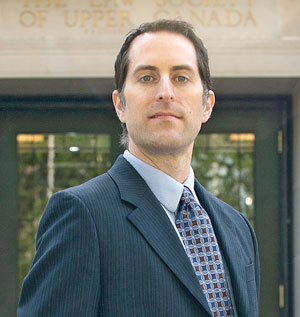The contentious debate as to whether paralegals should be allowed to practise in some aspects of family law is simmering while the Law Society of Upper Canada figures out a way forward on the issue.

The issue has been top of mind for family lawyers as a recent report by Justice Annemarie Bonkalo recommended allowing paralegals to practise in the area to help alleviate access to justice problems. The proposal is a controversial one for lawyers who see their work as being too complex for paralegals, and that adding them into the marketplace would do little to help with the obstacles in the way of getting more people legal representation.
“I see the recommendations from
Justice Bonkalo’s report being more like a very temporary Band-Aid solution rather than actually addressing the underlying problems,” says lawyer Michael Lesage.
The report contended that paralegals should be allowed to represent clients in matters concerning custody, access, simple child support cases, restraining orders, enforcement and joint divorces without property.
Proponents of the idea have said that allowing paralegals to offer services in some aspects of family law could help fill some gaps in the family justice system. More than 57 per cent of Ontarians who engaged with the family court system in 2014-15 were self-represented, according to government statistics.
Dozens of lawyers and paralegals packed into the law society’s annual general meeting on May 10 to voice their position on a motion that concerned the issue.
The motion, which was introduced by Lesage, called on the law society to release all the findings of any reports relevant to its review of whether the scope of family law should be broadened to allow paralegals to practise in the area and to give lawyer members an opportunity to comment on them.
Lesage says he would like to see the law society take its time to study the issue in-depth before considering any possible changes to the scope of family law and that members should be consulted at every step of the way.
Lawyers have said they are concerned the law society will reach a conclusion on the issues before membership is properly consulted, but the law society has said it is engaging in consultations. The motion also requested that the law society should require paralegal candidates to obtain an undergraduate degree along with “training equivalent to that provided by law schools in family law, tax and evidence.”
Lesage says he introduced the motion because he was concerned the law society would “reach the incorrect result if they were left to their own devices.”
At the AGM, Lesage took issue with recommendations in the Bonkalo report that would open up certain aspects of family law to paralegals. He said this kind of arrangement would be unworkable. Lawyers in support of the motion said the complexity of the area requires a higher level of knowledge, training and education than paralegals currently receive.
Omar Ha-Redeye, a lawyer who has trained paralegals, pointed out that in the Bonkalo report, there is a suggestion that there would be additional training for paralegals.
The Bonkalo report also recommended that the law society create a specialized licence for paralegals to provide services.
Ha-Redeye said that the resistance from the family law bar to change was to blame for the practice’s inability to tackle access to justice issues in the area.
“The reason that it has not been addressed is because of us, the lawyers,” he said.
After lengthy discussion, members voted to table to allow the law society to continue its consultations and come up with a plan before the motion went to a vote. Membership voted 68-48 to table the motion. If the motion had passed, it would not be binding on Convocation, but benchers would have had to consider it.
Unperturbed by the fact that his motion was shelved, Lesage says he is confident that the motion helped to amplify the discussion around the issue.
Lawyers and paralegals had until May 15 to submit feedback on the Bonkalo report to the law society. The law society plans to develop an action plan on the issue that it expects to release in the fall.

 The issue has been top of mind for family lawyers as a recent report by Justice Annemarie Bonkalo recommended allowing paralegals to practise in the area to help alleviate access to justice problems. The proposal is a controversial one for lawyers who see their work as being too complex for paralegals, and that adding them into the marketplace would do little to help with the obstacles in the way of getting more people legal representation.
The issue has been top of mind for family lawyers as a recent report by Justice Annemarie Bonkalo recommended allowing paralegals to practise in the area to help alleviate access to justice problems. The proposal is a controversial one for lawyers who see their work as being too complex for paralegals, and that adding them into the marketplace would do little to help with the obstacles in the way of getting more people legal representation.